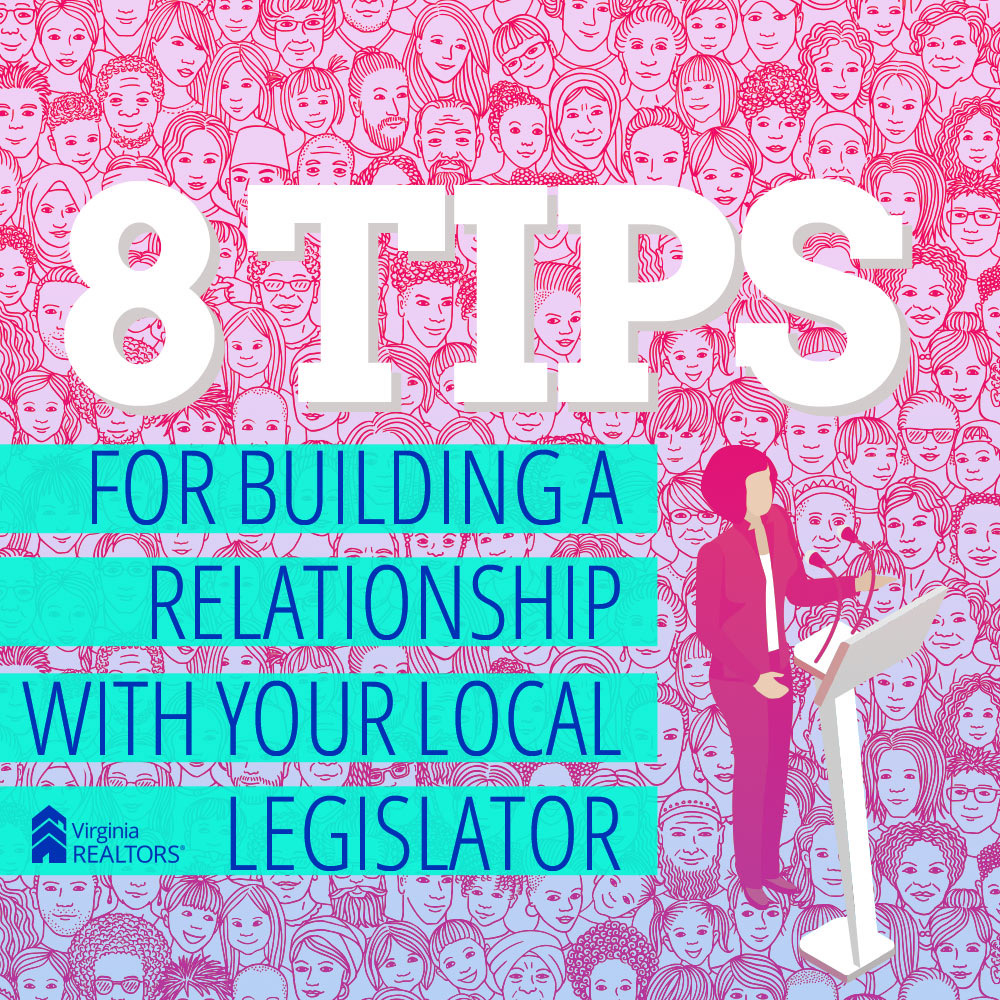8 Tips for Meeting with Elected Officials
November 22, 2019
By: Vice President of Political Operations, Anthony Reedy 
As we’ve discussed over the past few weeks, there will be many new members serving in the Virginia General Assembly come January. That means we’ll be educating a lot of new policy makers on the issues that impact you and your clients. And we’ll rely on YOU to help.
Whether you’re meeting with a city councilor, county supervisor, state legislator, or member of Congress, here are some tips that will help guide you through the meeting. These tips apply whether your meeting in D.C., Richmond, or back home in the district.
- Plan ahead. Make sure you know when, where, and who you are meeting with. Research the issues and have a few messaging points ready to discuss. If other REALTORS® are coming with you, decide before the meeting who will say what and in what order.
- Arrive on time, but be prepared to wait. Elected officials have crazy schedules, especially while at the Capitol. Be patient while you wait.
- Treat staff like you would treat the VIP. Sometimes you may need to meet staff instead of the elected official. Use it as an opportunity to get to the know them better and present your information. Staff are the “eyes and ears” of the member. They are valuable assets in your relationship building with elected officials.
- Be concise and stick to the issues. Your time will be limited, so keep to a few messaging points or real-life examples to get your point across. You can always leave additional information or follow up later. Keep the focus on relevant REALTOR® issues. Don’t go off on a wild goose chase.
- Be a resource. Offer your expertise as a resource on the local housing market and real estate issues. Elected officials count on you as a local expert to get a sense of what is happening in the community. However, don’t be afraid to say, “I don’t know.” It’s perfectly fine to follow up with correct information if you don’t have the details in the moment.
- Be respectful. If an elected official won’t commit to supporting our position or is opposed to it, don’t get mad. Let them know you understand their position, and thank them for taking the time to listen. This is a long journey; it’s important not to burn any bridges.
- Follow up. After the meeting, send a thank you note (REALTORS® are good at that). Follow through with any commitments you made during the meeting, whether it was providing additional information or connecting them with certain people.
- NEVER mix policy and politics. Yes, they go hand-in-hand, but never mix the discussion of specific policies and campaign talk. Keep them separate. Don’t bring up political contributions or campaign matters in an official government office or using government emails, phone lines, etc.
You might also like…
How REALTOR® Champions Fared in the 2024 Election
By D.J. Spiker - November 13, 2024
The votes are still being tallied in parts of the West, but the 2024 Presidential race is complete! Control of the House of Representatives is still to be… Read More
Governor Appoints Martin Johnson to Virginia Housing Commission
By Robin Spensieri - July 5, 2024
On July 3rd, it was announced that Governor Glenn Youngkin has appointed Virginia REALTORS® Chief External Affairs Officer Martin Johnson to the Virginia Housing Commission. Effective immediately, Martin… Read More
VA Signals Temporary Suspension on Buyer Agent Payment Ban
By Virginia REALTORS® - May 24, 2024
Earlier this week NAR announced breaking news that the Department of Veterans Affairs (“the VA”) has signaled a temporary suspension on buyer agent payment bans. While the VA… Read More